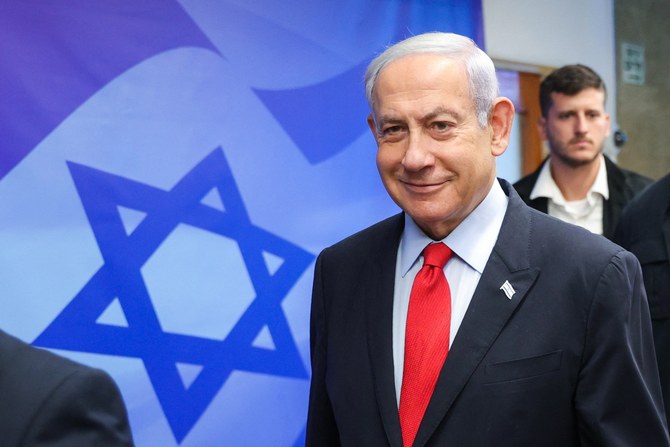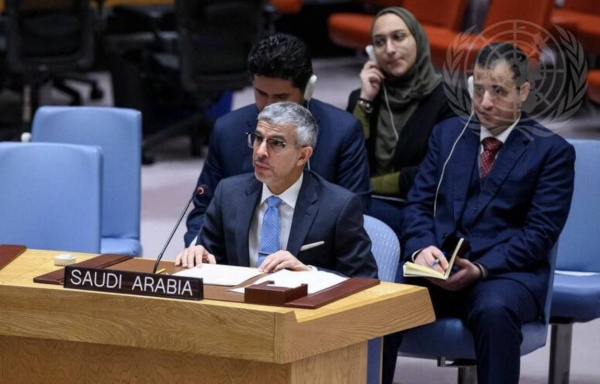
The UN Security Council on Monday passed a resolution that described the Houthi militia as a “terrorist group” and expanded an arms embargo against it. While Houthi leaders had already had their assets frozen and were under a travel ban and arms embargo, this has now been extended to encompass all members of the militia. It is hoped this will limit their access to arms and other resources and will allow the UN to intervene more readily.
While this situation has been left to rage on for far too long already, there is huge relief and gratification across the Gulf that this has finally come to pass. Already this year, the Houthis have launched dozens of ballistic missiles and armed drones against Saudi Arabia and the UAE and, despite retaliatory coalition airstrikes and UN sanctions, the attacks have not stopped.
The Houthis are believed to be provided with weapons by Iran, which Tehran denies. If Iran is supplying weapons to the Houthis, it would be violating the UN’s arms embargo. So why is it apparently being allowed to continue? Until now, it was rarely featured in the international news and no one seemed to be talking about it. However, the international community has placed very severe sanctions on the Russian state, as well as Russian businesses and oligarchs, in response to the invasion of Ukraine.
Back in 2016, it was said Russia had lost $170 billion directly as a result of financial sanctions imposed as a result of its actions in Ukraine, as well as more than double that amount indirectly. So financial and other sanctions can have a significant impact on countries that choose to attack their neighbors. Why, then, was more not done sooner to lessen Iran’s support for the Houthis? And why have the Houthis only now been described as terrorist when they have been causing death, destruction and unrest for years? In fact, the US alone did classify the Houthis as terrorist back in January 2021. However, there was concern that this might affect the ease or legitimacy of organizing negotiations with the group amid an already delicate political situation. Hence, new US President Joe Biden rescinded the designation the following month and has so far resisted calls to bring it back.
The war in Yemen has continued for more than six years. Not only are the people of Saudi Arabia and the UAE suffering as a result of the Houthis’ attacks, but the people of Yemen themselves are also suffering, with high levels of displacement and disease. The UN has described it as “the world’s worst humanitarian crisis.” In 2020, there were more than 2,000 reports of cholera in a single week, in addition to the country’s struggles with COVID-19. More than 2 million children were suffering from malnourishment last year. These children are Yemen’s future.
Beyond the direct physical effects on the people of Yemen, there are also the longer-term impacts of the disruption to education. In a world where COVID-19 has already turned education upside down, forcing children to revert to remote learning, one can imagine that in Yemen a stable internet connection is the least of people’s worries when homes are being lost to war. Still, education is continuing via television and radio, and higher education has continued.
The question is why did the UN and other international powers not intervene sooner? Instead they let this beautiful, fertile land and its highly motivated, intelligent people be torn apart, with no consequences for those carrying out the violence.
Sanctions are just one part of a whole strategy, to be used in combination with discussions, mediation and peacekeeping. After withdrawing from the Joint Comprehensive Plan of Action nuclear deal in 2018, the US imposed wide-ranging sanctions on Iran. This was as a result of Tehran failing to fulfill its obligations under the JCPOA. Iran is now refusing to agree to return to the nuclear deal unless those sanctions are lifted. Sanctions, as we have seen, are there for a reason — to gain negotiating power and to financially hinder those supplying arms that fuel conflict.
Iran benefits from having an allegiance with those that have power over the strategically relevant Bab Al-Mandab Strait, which is a vital route for transporting oil to the rest of the world. When combined with the possible threat of nuclear testing by Tehran, what can be done about its aggressive behavior in the region? The Arab nations need to find peace, which means Iran ceasing its support for the Houthis and their violent attacks on Saudi Arabia and the UAE.
Monday’s news from the UN came as a great relief, particularly at a time when a new conflict among neighbors has broken out with Russia’s attack on Ukraine. We can only hope that the UN’s rightful description of the Houthis as a terrorist group, along with the arms embargo and travel ban against its members, will put a stop to the attacks. Above all, Yemen needs to be united so its people and land can heal.
Dr. Bashayer Al-Majed is a Professor of Law at Kuwait University, and a Visiting Fellow at Oxford.
Twitter: @Bashayeralmajed
Disclaimer: Views expressed by writers in this section are their own and do not necessarily reflect Arab News" point-of-view











